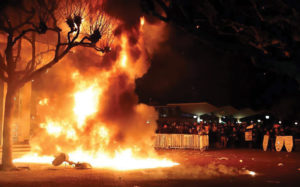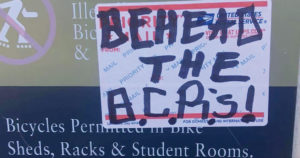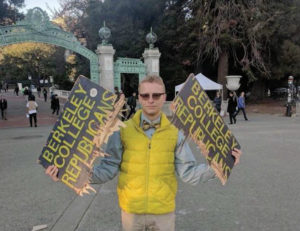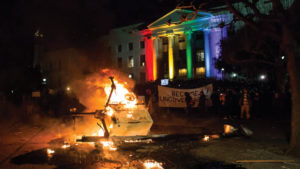In late January, the Attorney General of the United States, Jeff Sessions, and his Department of Justice, filed a Statement of Interest into the Berkeley College Republicans lawsuit against the University of California. “To attend to the interests of the United States in a suit pending in a court of the United States,” the DOJ may, from time to time issue Statements of Interest. The DOJ argues the “Plaintiffs’ amended complaint adequately pleads that the University’s speech restrictions,” as outlined in the Major Event and High-Profile Speaker Policies, “violate the First Amendment, and therefore, at least to that extent, the Court should deny Defendants’ motion to dismiss.”
First, I strongly encourage the DOJ to shed light onto issues of campus free speech nationwide because my generation has a tendency to pervert reality, which leads to more self-reassuring professors and teaching practices within higher education. The result will be poorly educated, or a generally misinformed public that believes they are highly educated (we could even call them ‘woke’), and can lead to the further degradation of higher education. What’s more dangerous: the ideas propagated by an educated elite that is pacifist with regards to the ideals of justifiable political violence in the name of tolerance, perpetrated by ANTIFA, BAMN, and other violent, anarcho-communist groups. In the long run, this could lead to the breakdown of civility in our Republic.
In this Statement of Interest, the DOJ claims, “The United States has a significant interest in the vigilant protection of constitutional freedoms in institutions of higher learning. As the Supreme Court has noted, ‘[t]eachers and students must always remain free to inquire, to study and to evaluate, to gain new maturity and understanding; otherwise our civilization will stagnate and die.’ Sweezy v. New Hampshire, 354 U.S. 234, 250 (1957). In recent years, however, many institutions of higher education have failed to answer this call, and free speech has come under attack on campuses across the country. Such failure is of grave concern because freedom of expression is ‘vital’ on campuses. Shelton v. Tucker, 364 U.S. 479, 487 (1960). Indeed, ‘our history says that it is this sort of hazardous freedom—this kind of openness—that is the basis of our national strength and of the independence and vigor of Americans who grow up and live in this relatively permissive, often disputatious, society.’ Tinker v. Des Moines Indep. Cmty. Sch. Dist., 393 U.S. 503, 508–509 (1969).”
The DOJ rightly claims “it is in the interest of the United States to ensure that State-run colleges and universities do not trample on individuals’ First Amendment rights” because this could undermine the Department of Education’s mission “to ensure that ‘institution[s] of higher education . . . facilitate the free and open exchange of ideas.’”
“Under the facts as alleged, it appears that the University repeatedly moved the goal posts for BCR, making it all but impossible for the event to take place,” due to discriminatory time, place, and manner restrictions.
“Plaintiffs contend that they are designated public fora, but the University claims that they are limited public fora. While this is a question properly left for later stages of the litigation, one thing is clear: the University’s High-Profile Speaker Policy and Major Events Policy would be unconstitutional in either type of forum,” the DOJ says, “if a regulation of speech discriminates on the basis of viewpoint or creates a high risk of viewpoint discrimination, it is immaterial whether the forum is a designated or limited public forum; under longstanding precedent, the regulation is unconstitutional… both Policies suffer from the same constitutional defect: they grant University administrators unbridled discretion to decide when, how, and against whom to apply the Policies. As the Interim Vice Chancellor admitted, the Policy applied only to ‘high-profile events featuring potentially controversial speakers.’”
Upon reading the Statement of Interest, Harmeet Dillon, lawyer of BCR and YAF, said, “Having pursued these core speech rights on behalf of our clients for nearly nine months against the University’s shifting positions and excuses, it is gratifying to see both the Department of Justice and General Counsel of the Department of Education agree with our position in court that strict scrutiny must apply to the University’s speech codes, which in turn constitute a prior restraint on fundamental rights guaranteed by the First Amendment.”
As I said to YAF.org on hearing the news, “The Berkeley College Republicans are grateful to the DOJ for filing a Statement of Interest into the lawsuit of discriminatory practices in stifling the guaranteed constitutional right of free speech brought against UC Berkeley. We are also grateful AG Sessions has called the success of the Ben Shapiro event hosted by YAF and BCR a ‘victory for free speech.’ We thank Harmeet Dillon and Dillon Law Group for their hard work on our case.”
YAF Spokesman Spencer Brown shared similar sentiments. “It’s incredible to see the United States government reinforcing in its SOI what YAF has said for months: Berkeley’s high-profile speaker policy and major events policy are ‘prior restraints on protected speech that invite viewpoint discrimination.’”





